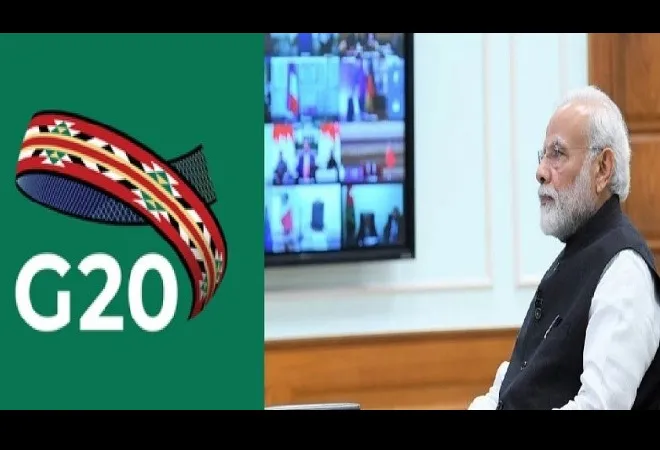
The 15th G20 Summit taking place on a virtual platform in November 2020 bears testimony to the unprecedented challenges brought about by the COVID-19 pandemic, both in terms of changing geopolitical chess board and the corresponding economic downturn. In the prevailing circumstances, many G20 members and the world at large are looking towards India — as a compelling, credible, and trustworthy major power — playing strategic role in the post COVID-19 global recovery.
Currently, India is well-positioned to take center stage in providing robust leadership and direction in the decision-making process of the G20 grouping, so that stability and equilibrium may be restored in the emerging global order in the aftermath of COVID-19 geostrategic turmoil. India’s ambitious multi-pronged strategy and potential to play a larger strategic role is increasingly being realised by the G20 members. The argument here is that India’s capability in managing global politico-economic challenges by enhancing collaborative approach while addressing issues like climate change, medical diplomacy, and technological innovation has created favorable optics for India to be at the center stage of the G20 forum. The hope and expectations are ripe at the present time because of India’s consistent track record of commitment to working responsibly in concert with the international community and in conformity with the established rules, norms, and principles of multilateralism.
India’s capability in managing global politico-economic challenges by enhancing collaborative approach while addressing issues like climate change, medical diplomacy, and technological innovation has created favorable optics for India to be at the center stage of the G20 forum
New Delhi’s call for reformed multilateralism with a spirit of deepened co-operation, credible mutual trust and convergence profoundly demonstrates the country’s determination to provide robust leadership in strategising the G20 agenda in the post COVID-19 global recovery process. In the contemporary fractured global geopolitical architecture, there is a perceivable vacuum created as the United States is grappled with fighting the pandemic along with ongoing presidential transition process. Meanwhile, major powers in the European Union are experiencing continuous economic downturn and COVID-19 resurgence, while China faces domestic problems because of increasing isolation by the international community due to trust deficit in the wake of the pandemic coupled with its belligerent expansionist posture. The current geopolitical disequilibrium provides India with momentous opportunity to fill the geostrategic void while creating credible imprint in the G20 club as a major strategic and economic powerhouse.
India’s pivotal role in shaping the contours of post COVID-19 world order by virtue of robust statesmanship in promoting reformed multilateral construct is well articulated by PM Modi’s deliberations,
“Like today, the world is facing a huge challenge in the form of Corona Virus. Financial institutions have also considered it a big challenge for the financial world. Today, we all have to face this challenge together. We have to be victorious with the power of our resolution of ‘Collaborate to Create’”.
India’s pivotal role in shaping the contours of post COVID-19 world order by virtue of robust statesmanship in promoting reformed multilateral construct is well articulated by PM Modi’s deliberations,
In contemporary geopolitical landscape India’s commitment to promote multilateral co-operation in establishing stability, security, and territorial integrity in the crucial Indo-Pacific Region is distinctly manifested in terms of playing pivotal role in QUAD architecture, an exclusive grouping comprising India, the United States, Japan, and Australia, pertaining to robust military collaboration in conjunction with identifying new vistas of strategic co-operation in areas related to connectivity, infrastructure development, security paradigm encompassing counter-terrorism, cyber-security, maritime security, humanitarian, and disaster relief mechanism with an objective of ensuring free, open, and inclusive Indo-Pacific marked by territorial integrity and shared prosperity. New Delhi’s recent endorsement for Australia’s participation in November 2020 Malabar naval exercises upping the ante against China demonstrates India’s strong resolve to counter belligerent behaviour of China while preserving geostrategic power balance in the Indo-Pacific region. Concurrently India’s Indo-Pacific Ocean’s Initiative (IPOI) is considered globally as a landmark geopolitical intervention and potential game-changer in propelling robust multilateral engagement between New Delhi and ASEAN partners encompassing politico-economic and socio-cultural frontiers while ensuring safety, maritime security, and stability in the Indo-Pacific region. Additionally, India’s pioneering role in rejuvenating other multilateral forums such as JAI (Japan-America-India) trilateral grouping, BIMSTEC, Indian Ocean Rim Association (IORA), and BRICS (Brazil-Russia-India-China-South Africa) demonstrates New Delhi’s strong determination towards robust diplomatic engagement in shaping the trajectory of emerging regional and trans-continental geopolitical nomenclature.. India’s persistent endeavours in bolstering geostrategic cooperation in the strategic Indian Ocean Rim Association (IORA) and consistent with its pioneering vision of SAGAR (Security and Growth for All in the Region) further reflects New Delhi’s potential as formidable first responder in providing security in Indian Ocean Region.) Such credible interventions effectively demonstrate India’s statesmanship and compelling capability in influencing global geopolitics.
In the wake of COVID-19 crisis, New Delhi’s advocacy for creating the Global Index and G20 Virtual Secretariat is destined to provide vision, direction and resilience to G20 grouping. While opening new dimensions of reformed multilateralism India leads the way to create and effectively manage vast talent pool; ensure technology and innovation reach all segments of the society; enhance transparency in systems of global governance; deal with issues related to climate change; and save planet Earth with a spirit of Trusteeship. Addressing the 15th G20 Summit, Prime Minister Narendra Modi reiterated India’s commitment towards building a new world of reformed multilateralism as he deliberated:
“This is the best time for further increasing research and innovation in new and sustainable technologies. We should do so with a spirit of cooperation and collaboration... Today we are focused on saving our citizens and economies from the effects of the global pandemic. Equally important is to keep our focus on fighting climate change. Climate change must be fought not in silos but in an integrated, comprehensive and holistic way.”
With India imminently playing a critical role in concert with some other G20 nations towards vaccine development, research, and distribution, the call for heightened transparency in global governance is timely, far-reaching, and consequential in shaping the trajectory of post-COVID-19 public health system. New Delhi’s time-tested pharmaceutical and vaccine development capabilities rightfully bring the country at the centre stage of the G20 setting. With India producing 60 percent of the world’s vaccine and accounting for 60-80 percent of the United Nations’ annual vaccine procurement it attracts international attention as powerhouse of COVID-19 vaccine manufacturing. Consistent with India’s potential for gigantic medico-diplomatic interventions, it is heartening to see that Pune-based Serum Institute of India (SII), world’s largest vaccine manufacturer capable of producing 1.5 billion vaccine doses annually, has partnered with the University of Oxford and global pharma company AstraZeneca in providing lead role to produce COVID-19 vaccine “Covishield” and distributing domestically as well as globally especially to low-and-middle income countries. SII is confident of producing 400 million doses by mid-2021 . Hyderabad-based Bharat Biotech has developed India’s indigenous COVID-19 vaccine “Covaxin” in collaboration with the Indian Council of Medical Research (ICMR), while aiming at providing at least 100 million doses in early 2021. Ahmedabad-based pharma major, Zydus Cadila, currently engaged in producing COVID-19 vaccine “ZyCov-D”, aims at rolling out about 100 million doses annually). Notably, some 60 foreign heads of mission visiting Indian bio-tech companies in December 2020 praised India’s impressive research and manufacturing facilities with regard to COVID-19 vaccine development while reiterating confidence on New Delhi’s playing leadership role in delivering vaccine globally and fighting the menace of the disease. Moreover, India’s massive vaccination drive, the world’s biggest ever, commencing on January 16, 2021further showcases India’s compelling capability to play leadership role in shaping the trajectory of post COVID-19 global public health governance.
With India imminently playing a critical role in concert with some other G20 nations towards vaccine development, research, and distribution, the call for heightened transparency in global governance is timely, far-reaching, and consequential in shaping the trajectory of post-COVID-19 public health system
In the wake of COVID-19 crisis India reiterates commitment in addressing complex challenges related to climate change and environmental protection. In his address at the 15th G20 Summit, Prime Minister Narendra Modi deliberated about India’s concerted approach towards balancing development and environment on the G20 platform. Towards that end, India has set a strong example as the only country among G20 nations that is on track towards meeting what it had promised in 2015 Paris Agreement in terms of being the only 2 degree Celsius compatible country and is much ahead as compared to other G20 countries in terms of fulfilling this commitment. Concurrently, India’s leadership role in delineating the success of India-France led International Solar Alliance comprising 88 signatories is globally well acclaimed as a turning point intervention in mobilising resources towards promoting research and development in renewable energy. Also, the vision of ‘Self Reliant India (Atma Nirbhar Bharat)’ initiative is expected to play transformational role for “New India” in global paradigm as an important and reliable pillar of world economy and global supply chains in the aftermath of COVID-19 crisis. New Delhi’s endeavour of establishing the Coalition for Disaster Resilient Infrastructure, comprising nine of the G20 nations amongst others provides new dimensions of leadership in the global growth process.
All set to take over the G20 presidency in 2023 New Delhi is destined to play lead role in the post COVID-19 global recovery process. Concurrently, the rising discontent among most of the G20 countries on China’s irresponsible behaviour regarding the pandemic coupled with its sinister expansionist intentions allows the world to focus on India as a responsible global power backed by vibrant democracy having robust military and economic capabilities.
India’s run up to take over the G20 presidency is going to be paramount in pushing through pressing agenda and hammering out viable roadmap while addressing complex global challenges arising out of evolving post COVID-19 geopolitical contingencies.
The views expressed above belong to the author(s). ORF research and analyses now available on Telegram! Click here to access our curated content — blogs, longforms and interviews.




 PREV
PREV


